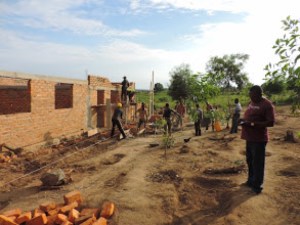Butoke is a small NGO which works in the Democratic Republic of the Congo (DRC) with the poorest people on earth.
Butoke is run by Dr. Jean Lumbala Muamba, a doctor who is also an agronomist. It runs several schools, looks after orphaned children, provides basic healthcare and feeds the malnourished and starving who come through its doors. It also runs a food security programme: its agronomists work with a large number of agricultural associations which work with local communities. Finally, its Justice Project helps victims of sexual violence.
Butoke’s main activities
Education: with the assistance of its supporters Butoke built and opened a school in September 2015. By 2018 Butoke was operating two primary schools as well as a secondary school. The secondary school provides both academic and vocational training. For example, it offers tailoring courses which are popular with some of the most disadvantaged students as they offer the prospect of immediate paid employment. Both primary and secondary schools achieve far above average pass rates in national exams.
Butoke tries to assist some of the ablest children who pass through its schools to go on to higher education. Currently it provides 15 students (8 women and 7 men) with university “scholarships”. The subjects they are studying include law, medicine, nutrition, health management, nursing, midwifery and psychology. The scholarships are intended to cover the cost of tuition and materials and are for between $400 and $800 a year. Students who receive this assistance agree to return to Kananga and work with Butoke for a period after they have graduated.
The ongoing scale of the crisis in education in the DRC is illustrated by the fact that there are about 2 million 6 and 7 year olds who are not in school at all because of a lack of school places.
Butoke’s nutrition programme: one of the problems Butokes faces is that the communities with which it works are so impoverished that malnutrition is ignored until it becomes acute or infections develop.
Butoke’s nutrition programme is focused on the children who live in its orphanage. They normally include children with no known family, children with no parents but some local relatives who are unable to care for them, and children whose mothers have died and whose fathers will not care for them. This last category may have been abandoned by their fathers after having been accused of being “witches” (and as such responsible for the deaths of their mothers).
Butoke provides nutritional assistance to children identified by its Tshikaji health post or community visits as malnourished. They enter a short term rehabilitation programme, including a feeding programme and training for their parents in proper nutrition.
The clinic: Butoke has three clinics. Two of them focus primarily on healthcare for expectant and new mothers and children. The other focuses primarily on adult healthcare. Their quality has been recognised by the Congolese authorities, which have licensed each of them. Unfortunately the authorities do not contribute to their running costs. Those who cannot afford to pay anything for their treatment are treated free of charge. Those who can afford to pay something do.
The orphanage and shelter for the elderly: Butoke does its best to arrange for children to be accommodated in foster families rather than living in its orphanage, even if they attend for meals. The number of orphans fluctuate. Butoke also operates a shelter for the elderly. These tend to be old people who have no family and who are completely without resources of their own.
Agriculture and fish farming: Butoke works with many local agricultural associations. Butoke insists that women are involved in the management committees of its association partners. Butoke has helped educate its association partners in agricultural techniques, for example helping to introduce cassava varieties which are resistant to common pests. Butoke introduced fish farming to a number of its association partners to increase the amount of protein available to villagers.
The Elsa Corp Justice Project: Butoke provides assistance to the victims of sexual violence. In particular it provides legal assistance (without which cases will not be prosecuted) and medical care.
The Friends of Butoke Charity
The Friends of Butoke Charity (Registered Charity no. 1140094) raises funds for Butoke. 100% of the money given to the Charity goes to Butoke as the running costs of the Charity are covered by the trustees: Matthew Pollard, Adriane Pollard, Marleen Tiemens and Paul Evans.
The Charity has its books independently examined each year by a Fellow of the Association of Charity Independent Examiners. Copies of the annual independent examination reports are available on request.
Contact details
For all and any queries email Paul Evans, one of the trustees, paulevans@blueyonder.co.uk
You can sign up to our annual newsletter and other communications here.
The Friends of Butoke Charity, Registered number 1140094 (England and Wales) Registered Office: 5 Westville Avenue Ilkley LS29 9AH
Latest News
July 2025 Update
Our annual report is now available to read here. Please read it to see what Butoke has achieved in the last year, and hear first-hand the experiences of the people it supports. Pictured above: the new health center supported by Butoke, which opened December 2024
November 2024 – Butoke’s new Christmas cards are on sale!
Our Christmas cards are on sale at £5 for a pack of ten (plus postage). If you would like to order some, please email Paul Evans. We now offer gift certificate inserts for your cards. For any enquiries please email Paul Evans.
July 2024 update
Our 2024 Newsletter is now available. Please do read it to see what Butoke achieved in 2023.




